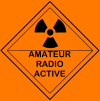QSO Today Amateur Radio Podcast Glen Jenkins - WB4KTF
Glen Jenkins, WB4KTF, grew up on US Marine bases in the 50’s and 60’s, and was no stranger to starting over in new places
Chelmsford Talk: Marconi and the invisible universe
At 2pm on Tuesday, March 31 in Chelmsford Professor Danielle George MBE will give a talk on Marconi and the invisible universe. Tickets are Free, register now!
ARISS contact with River Ridge High School, New Port Richey, FL
An International Space Station school contact has been planned with participants at River Ridge High School, FL. The contact should be audible over the state of Florida
ARRL Audio News - February 28, 2020
ARRL Audio News - February 28, 2020
UK Telecoms Regulator Ends Policy of Granting Two-Letter Call Sign Suffixes
UK telecommunications regulator Ofcom has said it no longer will issue two-letter suffix call signs to Full Licence holders. Since mid-2018, radio amateurs attaining the highest-class license have been able to apply for “short”call signs such as M5xx. The policy has provided a major incentive to upgrade. Ofcom said call signs with only two letters in the suffix are only available to applicants ...
International Space Station Resupply Mission to Carry New ARISS Ham Radio Gear
The scheduled March 7 SpaceX CRS-20 mission to the International Space Station (ISS) will include the initial Amateur Radio on the International Space Station (ARISS) Interoperable Radio System (IORS) flight unit. The IORS is the foundation of the ARISS next-generation amateur radio system on the space station. The ARISS hardware team built four flight units, and the first will be installed in ...
Connecticut Valley FM Association
Claremont, NH
DL1BI German Amateur Radio Station
All around HAM Radio - DL1BI Amateurfunk Station
SQ9MDD
Ham radio station from Poland
Jennings County Amateur Radio Club
Jennings County, Indiana
HamBrasil
Cadastro de Radioamadores Brasileiros, call sign database for Brazilian stations
University of Hawaii Radio Astronomy
Online receiver streams signals from Jupiter and the sun
Global Shortwave Coordination
The A20 Global Shortwave Coordination Conference was this week in Kuala Lumpur, from 24-28 February. The conference provided an important forum to resolve or minimize instances of mutual interference among shortwave transmissions for the Summer (A20) season
Cardiff Microwave Roundtable March 7
The schedule of talks for the amateur radio Microwave Roundtable to be held in Cardiff on Saturday March 7 is now available
The surprising way solar storms beach whales
Space weather isn't just for humans. Whales are experiencing it, too
A working scale model of a HF curtain
A working scale model of an HF curtain array antenna is on display at the National Voice of America (VOA) Museum of Broadcasting in West Chester, Ohio
Ofcom EMF Consultation: RSGB release briefing paper
Following the launch of an Ofcom public consultation on Electromagnetic Field (EMF) exposure the RSGB has released a briefing paper for all UK radio amateurs
I0-5639/FR SWL Blog
Shortwave listener blog from near Rome Italy
M0SCG-Sands Contest Group
Diary of a small contest group
G0HWC New Ham Shack
Pictures of the restructuring of the ham shack starting from an existing garage. Changes includes isolation of walls and roof and rebuilding of the radio table.
W3VC - Carnegie Tech Radio Club
Pittsburgh, PA
Wuxi Venus Information Technology
Shopping and Services/Regional/Asia
Wuxi Venus Information Technology is an amateur radio devices dealer in China, source for high end, high performance RF products,Control products,APRS products and Commercial products. It provides a variety of solutions to the antennas systems, APRS,electronics kits and electronics components
PerthTech
PerthTech is a premiere annual Australian Amateur Radio event.
The day of technical presentations is on Saturday 2nd May, with practical workshops on Sunday 3rd May
2020 National Convention Booklet
The SARL 2020 National Convention Booklet is available for download from the League web site. Click on the link on the front page or visit the AGM Documents page
Royal Netherlands Army's Belize operation
Look for the 11 Airmobile Brigade from the Royal Netherlands Army and Radiosquad to be active as V31FX
AM QSO PARTY in Europe, the results are in!
The results are in for last month's very first AM Europe QSO PARTY
Congratulations to the winners of each section and thank you to those who submitted a log. There were over a 100 stations heard or worked in the event, but few logs submitted
Can mobile networks connect first responders in remote areas?
The National Institute of Standards and Technology (NIST) has published an article that looks at the challanges of providing communications in remote areas
Ofcom stops issuing short Full Calls
Since the middle of 2018 those passing the RSGB exam for the Full licence have been able to apply for short call signs such as M5xx, this has provided a major incentive to upgrade to Full
ARRL Seeks a New Chief Executive Officer
ARRL is seeking an experienced radio amateur to be Chief Executive Officer (CEO) at its headquarters in Newington, Connecticut. The CEO is the top compensated employee in ARRL’s management structure and oversees all operations in collaboration with the President and the Board of Directors, in accordance with ARRL’s Articles of Association, Bylaws, and Board policies. The successful candidate wi...
All about Lightning protection
Thierry LOMBRY, ON4SKY, gives advice to amateurs about lightning protection of an hamshack, including pictures and links.
BFRR
The Belarussian Federation of Radioamateurs and Radiosportsmen (BFRR), the member society of International Amateur Radio Union (IARU). HQ is based in Minsk city, Belarus
ASVARO
Association of Silicon Valley Amateur Radio Organizations.
ASVARO is a California non-profit public benefit educational corporation (501(c)(3)) dedicated to supporting amateur radio for education and public service. Located in the Silicon Valley of California
LY4A Daily Dx News
LY4A contest station ,hamradio ,contesting,DX News,DX Info.
SJVARA
A small amateur radio club located in northern Maine along the Saint John River.
HamBuilder
Shopping and Services/Kits and Components
Amateur radio kits dealer, online shop for ham radio transceiver kits.
|







